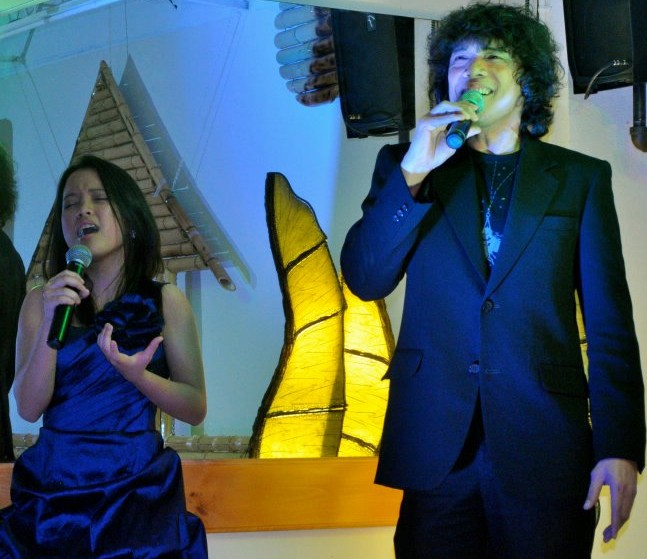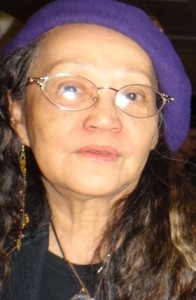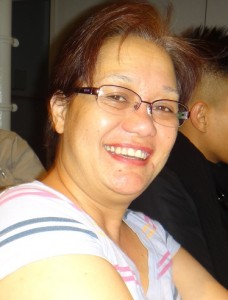In literary fundraiser, Filipino American writers recall a love affair with typhoons

The Asian American Writers Workshop hosted the fundraiser. With (from left) AAWW President Ken Chen, Jessica Hagedorn and Bino Realuyo. The FilAm photos
Jackie Aguilos Duerr from Kinnelon, New Jersey came to a fundraiser organized by Filipino American novelists, poets and journalists. She left the event feeling upbeat rather than downhearted.
‘Kaya natin: We can do this’ was a fundraiser like no other. Discarding the traditional moment of silence in remembering the dead, the writers offered a cheer-like shoutout for Tacloban and other cities in the Visayas flattened by Typhoon Haiyan, and then they paid homage to Philippine typhoons.
“I seem to have a lot of typhoons in my novel,” said novelist, playwright, and performance artist Jessica Hagedorn. She noted how in her three books “Gangster of Love,” “Manila Noir” and “Toxicology,” there seems to be the recurring images of water and disasters.
In the Philippines, she explained, “typhoon is a fact of life.” She then proceeded to read a chapter called Tropical Depression from her book “Gangster of Love.”
For one who grew up in Manila, the author of “The Umbrella Country” Bino Realuyo said he too loves typhoons and watching flood waters rise and ebb from the safety of his home. “That’s the Philippines for me,” he recalled.
Novelist Ninotchka Rosca remembered her first hurricane in New York, a term that she thought was stronger than a typical Philippine typhoon. She did what most New Yorkers did and that was to tape glass windows and fill her bathtub with water in anticipation of possible dire aftermath. The weather passed quietly, and she thought, “That’s it? That’s not a hurricane. In the Philippines that’s a rainfall.”There is a “frightening beauty” to typhoons, said investigative journalist Sheila Coronel, recalling how her travels to Philippine provinces in inclement weather would find her stranded at hotels and waiting patiently for the typhoons to slow and the flood waters to recede. The Philippine way of life is framed by the forces of nature in the acronym B-B-L for ‘Bagyo’ (Typhoon)-‘Baha’ (Flooding)-‘Lindol’ (Earthquake), she said.
Coronel said there is something about the recent super typhoon Haiyan that should make the Philippines reflect on the “existential” question: How will the county survive in an environment of climate change. She noted how global warming has resulted in severe rainfalls for some Philippine provinces and acute dryness for others, causing serious impact to food supply for rice-producing regions, such as Mindanao.
The death toll from Typhoon Haiyan is estimated at more than 5,200, making it the deadliest typhoon that has hit the Philippines. An average of 22 to 24 typhoons visit the country a year, Philippine Ambassador Jose Cuisia has said on CNN’s Piers Morgan show. About 400,000 Filipinos are said to have lost their homes and property. Rebuilding the region is estimated to cost the economy $6 billion (or P258 billion), about 13 percent of the country’s national budget.
“This should be of concern to all us even if we’re not in the Philippines,” she said.
The scenarios for the Philippines are “really frightening,” said Coronel. She said the country is not grounded on long-term planning while its dysfunctional political leaders look only toward six-year election cycles. Despite the vicious acts of nature, Filipinos retain their unyielding spirit, resilience and determination to survive, she said.
The Tacloban-born Duerr found solace in the event where she represented her organization Kusog Tacloban (Strong Tacloban) and met with the Filipino community’s literary giants. Duerr said her family, all 47 members of them, lost their homes from the typhoon. With her savings and some financial assistance from friends, neighbors and her office, she managed to get them to a safe location in the nearby province of Cebu. Many in her family, including her 78-year-old mother and a two-month-old baby niece, are now living in a rented house. Three days after the typhoon, her son Jason from New York flew home to the Philippines to manage the family’s relocation. He drove the van that transferred the family in batches from Tacloban to Cebu.
“My family is OK, although they lost everything,” Duerr, 52, told The FilAm. “My mom was very traumatized.”
She was thankful to the writers for making her organization, Kusog Tacloban, one of the recipients of the fundraiser.














[…] Originally published on the FilAm. […]